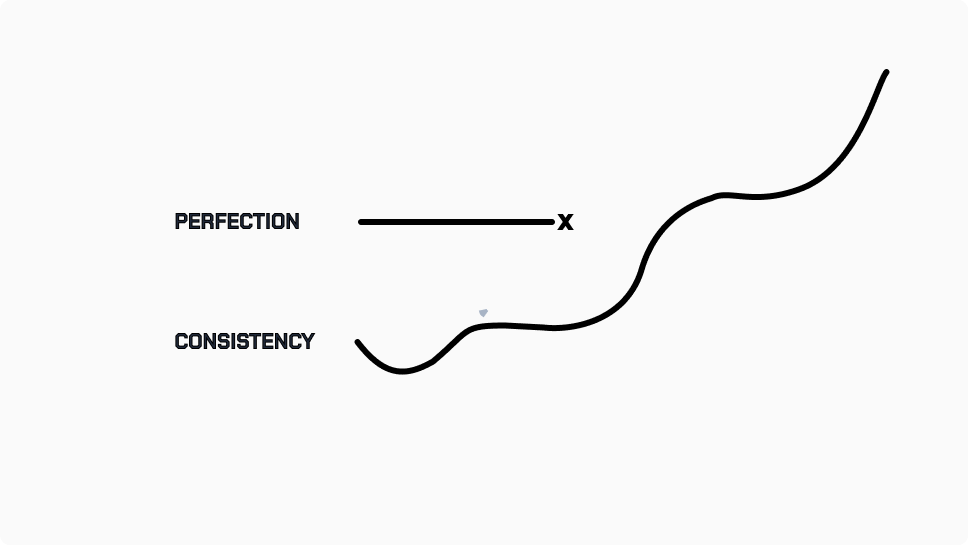1 Big Idea
This week I’ve been thinking about how perfection — or the pursuit of it — often makes us weaker, not stronger.
I’ve tried chasing the “perfect” week more times than I’d like to admit. Those weeks where I expect to eat clean, smash every training session, wake up early, get deep work done, stay off my phone, and still have energy left over to be present, creative, and inspired.
And for a few days, it works.
But then something slips or life throws something unexpected my way. Suddenly, the whole structure collapses. It’s all or nothing — and when it’s not perfect, it feels like failure.
That’s the danger of chasing perfection. It looks strong on the outside, but it’s brittle underneath.
The Russian biologist Ivan Schmalhausen saw this in nature. When a species evolves to become too good at one thing, it often becomes dangerously vulnerable elsewhere. A lion that grows larger to hunt more effectively also becomes a bigger target. A tree that grows taller to reach more sunlight becomes more likely to snap in the wind.
There’s a cost to precision. The more optimised something is, the less room there is for chaos, for creativity, for real life.
The times when I try to structure every minute, optimise every system, and squeeze every ounce of output — those are usually the weeks where I feel the most robotic. Productive, maybe. But not creative or truly alive.
Albert Einstein knew this. He’d take long walks on the beach or lie down in the middle of the workday and stare at the ceiling. Not because he was lazy, but because he understood that doing nothing was sometimes the most important thing. That margin — the inefficiency — gave his mind space to roam, to connect the dots, to create.
Perfect sounds impressive. But imperfect is flexible. It bends, it adjusts, it endures.
And that’s what high performance really looks like — not a flawless routine, but a sustainable one. Not precision, but adaptability. Not perfection, but momentum.
3 Weekly Lessons
#1 There Are No Adults
Low-agency thinking often hides behind a quiet belief: that somewhere, out there, there’s a group of all-knowing adults running the show. But there is no god-class. No flawless committee. No secret group that figured it all out. Even the greats were wildly imperfect — Jobs ignored cancer treatment, Mozart begged for money, Newton obsessed over alchemy, and Nietzsche died alone and bitter. The more you read, the more you realise: Superman is usually Clark Kent.
#2 Rituals Lead to Effortless Action
Confucius’ students were taught to memorise shelves of ancient texts, to bow at the correct angle, to take precisely measured steps as they entered a room. Even their sitting mats had to be perfectly straight.
But all this rigour wasn’t about rigidity. It was about internalising discipline so deeply that it eventually became second nature. The goal was to move beyond effort and into a genuine, spontaneous expression of mastery.
#3 Simple Transcends Genius
The smartest ideas aren’t the most complicated — they’re the most obvious after you’ve heard them. Complexity can be a mask for insecurity. Simplicity, on the other hand, is what you arrive at when you actually understand something. Whether it’s a training plan, a topic you’re studying, or a way of living — if it isn’t simple, it probably isn’t sustainable.
5 Things Worth Your Time
A collection of links and other stuff I think are worth sharing.
◾️ High Agency in 30 Minutes: A brilliant article with an idea so simple yet effective it may change how you view reality.
◾️ Antifragile: A book that explores the idea that some systems benefit from chaos.
◾️ Chris Williamson x Naval Ravikant Podcast: 44 harsh truths about human nature.
◾️ How Running & Lifting Improved My Life: My latest YouTube video. Four years ago I was in the worst pain of my life after being diagnosed with a chronic illness. Today I’m the fittest and healthiest I’ve ever been thanks to hybrid training.
◾️ Toolfinder: Awesome directory that lists a ton of super useful apps and websites for anything and everything.

